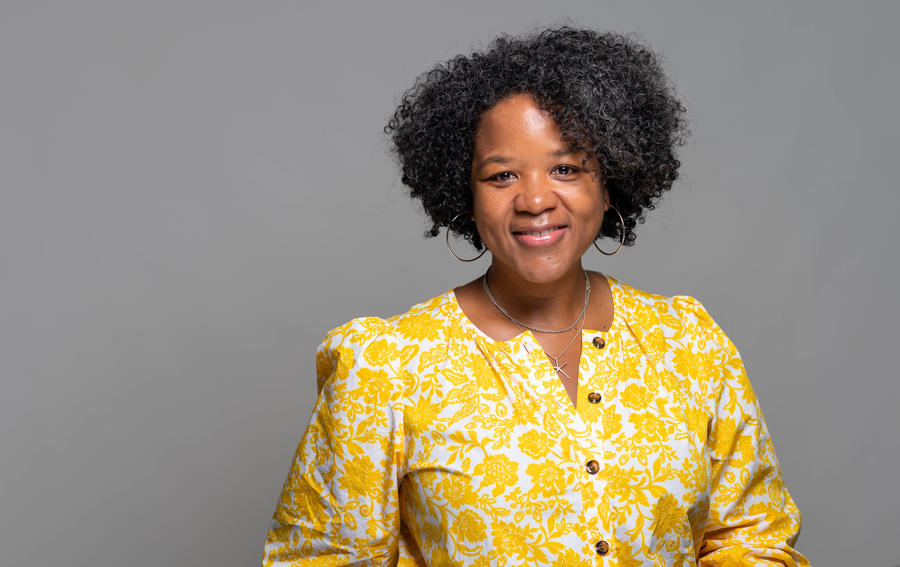How Alexis Seth seeks equitable outcomes for tech's end users
While providing program and project management for the Leidos Innovation Lab in the Civilian Health Solutions Group, Alexis Seth uses a consultative approach. Her strategic guidance helps improve user experiences during digital modernization efforts. Crucially for her, she is well-positioned to champion equitable outcomes for all.
Through her prolific volunteer efforts, Alexis has long focused on advancing racial equity and supporting underserved communities. In fact, while serving on the Board of an independent school in Baltimore, she chaired a committee focused on community inclusion and equity. Her committee helped ensure the school’s leadership more closely listened to, resembled and represented its entire student body after learning that its Asian student population was severely underrepresented and not reflected in the school's administration.
Despite her successful volunteer efforts, her personal passion for racial equity never intersected with her professional work during the first 25 years of her career. That changed when she landed at Leidos.
Pursuing equitable outcomes via technology
Shortly after joining Leidos, Alexis shared her volunteering background with Innovation Lab leader, Heather Smith. Heather encouraged her to pursue further research related to how federal agencies could use technology to deliver the desired outcomes in advancing racial equity. This led to Alexis authoring a Leidos thought case on the subject within her first six months in the organization.
“Based on my past job experiences, I hadn't considered how I would bring my racial equity work forward in a specific and tangible way," Alexis says.
“I do my best daily to live my value of advancing racial equity, but I got the space in the Leidos Innovation Lab to research trends, ideas and data, and to articulate a specific perspective for Leidos to serve our customers.”
Alexis’ customer-facing paper shared principles to identify the root cause of unequal outcomes before making adjustments, and to include as many people and perspectives as possible when developing processes and delivering solutions. These strategies, she says, give organizations the best chance of yielding the right outcomes for all.
“When we define a set of outcomes for citizens, we must ensure that we include everyone,” she says. “This means we need to ask if everyone is getting the same experience—and acknowledge that when a particular group isn’t getting the same access or outcomes, it’s not a case of them being deficient in some way, but one where the processes and systems that should be serving them aren’t working.”
Since presenting her paper, Alexis has been excited to work with Leidos colleagues who are working to integrate principles of equity in technology use within Leidos.
“The research I did while writing our thought case wasn't even in connection with internal efforts, but in the two years after I presented it, I am discovering opportunities to work with more colleagues who are advancing similar work here at Leidos, including our focus on reducing bias in responsible and trustworthy AI,” she says. “By considering racial equity while guiding policies around the proper development and use of artificial intelligence, we uphold our value of integrity.”
Patience, Persistence and Compassion: The hallmarks of Alexis’ career
Years ago while working as an analyst at another private sector organization, Alexis was tasked with taking notes during discussions between several government agencies and her company.
“I knew I was capable of doing more than capturing notes, but I did it,” she says. “I took that duty seriously, making sure the content was right and that the notes were delivered on time. Later, my manager came to me with an unusual request from our customer—that I travel with them for a full day’s meeting in another city.”
It turns out that, due to the quality of Alexis’ work, her customer saw her as most qualified to offer counsel during and between meetings.
“They recognized me as a trustworthy advisor. From that point, there was never a task that I looked at as beneath me,” she says. “That experience helped me realize that listening as well as gathering and synthesizing information to guide others is a sort of superpower, and I’ve continued to fill that role for the rest of my career.”
She also notes that patience, persistence and compassion are essential when it comes to pursuing positive changes, including DEI efforts. Patience and persistence to stay the course when change feels slow, and compassion for those who struggle to understand the need for change and adapt to it.
“If you're like me, we assume we're ready for change. Truth is -- change can be hard for all of us. We have to show compassion for ourselves and others,” she says.
Soon after she penned her thought case, Alexis began to support initial drafting of the digital modernization strategy. The senior leader on the project asked her for a copy of her thought case to help advance racial equity as a core tenet of digital modernization. So, while she didn’t see an immediate internal response to her thought case on racial equity in and through IT, Alexis has watched it pick up steam since.
“There are times when something seems disappointing at first, but I’ve learned to be patient. People begin to understand and take action in their own time,” she says. “Ultimately, when you work on what you care about and pursue progress on that front, others who also care about it will come to you. Soon more people notice and your original efforts perpetuate your goals.”
Continuing to pursue individual and collective progress
During a recent self retreat, Alexis took time to reflect on her values. She realized two she cherishes most are acting on personal responsibility and supporting Black people living and thriving.
“I’m grateful that I have the flexibility at Leidos to step away like this and get the space to consider what I care about and how to support it,” she says. When Alexis returned from her retreat, one of the first things she did was ask how we can see more Black women leading and thriving at Leidos.
“When I asked how we can make that happen, I got specific and helpful feedback about how to advance and what emerging leaders need to understand,” she says. “I took that to heart and asked for exposure to everything I still need to learn. Leidos is a good organization. I can ask these types of questions and figure out what’s next here because I have good managers who take an interest in my career and want me to succeed.”
Have questions for Alexis? She’ll be a panelist at our virtual Leidos Collaboration and Career Event to take place Wednesday, November 8, from 12:00–1:30 p.m. EST. Register to attend, and if you’re interested in building a career at Leidos, check out our open jobs today.

